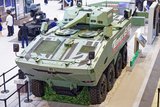Thales sights for Scout SV
Thales has been awarded a £125 million contract to supply sighting systems and ancillary equipment to General Dynamics UK for the UK's Scout specialist vehicle (SV), the company announced on 30 July.
Under the production phase of the Ministry of Defence's (MoD) SV programme, Thales will supply 245 vehicle set packages for the Scout variant. Each set will include the Orion Primary Sight armoured vehicle sighting system, Local Situational Awareness (LSA) camera system and Smoke Dispenser. The sights will be delivered between 2016-2021.
In addition, Thales will supply another 344 vehicle sets of LSA systems for other versions of the SV in the same five-year period.
The contract also covers an initial spares provisioning package. Thales will build the systems at its optronics facility in Glasgow.
Victor Chavez, CEO, Thales UK, said: 'Our sighting systems for the Scout SV vehicle will provide the UK MoD with a step change in its vehicle reconnaissance and surveillance capability and will greatly enhance the prospect of mission success and survivability on the battlefield. The contract underlines our position as the UK MoD's sighting system supplier of choice and is a tribute to the innovation and skill of our employees in Glasgow.'
Related Equipment in Defence Insight
More from Land Warfare
-
![US DoD task force’s DroneHunter acquisition lays groundwork for Replicator 2 CUAS strategy]()
US DoD task force’s DroneHunter acquisition lays groundwork for Replicator 2 CUAS strategy
As the US Department of Defense looks to counter the growing threat of uncrewed aerial systems to improve homeland security, the DroneHunter acquisition could point to future commercial innovation.
-
![Norway opts for Hanwha’s Chunmoo for long-range fires under $2 billion deal]()
Norway opts for Hanwha’s Chunmoo for long-range fires under $2 billion deal
The selection of Hanwha’s K239 Chunmoo long-range precision fires system, with a contract expected to be signed on 30 January, makes Norway the second European country to choose the system. It is expected an operational system will be in service within four years.
-
![Land forces review: Tanks, trucks and IFVs dominate but woes remain for Ajax]()
Land forces review: Tanks, trucks and IFVs dominate but woes remain for Ajax
This year has begun with main battle tanks taking the lead while orders for large logistics and support vehicles continued from last year. Additionally, two of the British Army’s most significant contracted vehicle programmes, Ajax reconnaissance vehicle and Challenger 3 tank, continued to make news in January.























